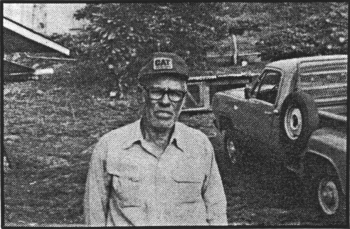Fred Iona

A Social History of Kona
This project, a case study of Hawaii's social history, focuses on Kona where people nurtured the development of a community and participated in and witnessed some.of the major historical developments of the islands.
Fred Iona, a Hawaiian-Portuguese farmer, was born on March 19, 1899, in Pahoehoe, South Kana, Hawaii. He was the youngest of eight children, and his father was a teacher at Alae School. Iona left school after the fourth grade to work on the Magoon Ranch in Pahoehoe. He eventually acquired his own land and cultivated various crops, including 'awa, banana, macadamia nuts, and peanuts. Iona is an active member of the Macadamia Nut Growers Association and continues to farm his land.
Scope and Content Note:
Session 1: This interview with Fred Iona, conducted by Ray Kala Enos on December 18, 1980, provides a detailed account of Iona's life and experiences as a farmer in Pahoehoe, Kana, Hawaii. Iona discusses his early life, including his upbringing, his family, and his decision to leave school to work on a ranch. He also shares his experiences and perspectives on farming, including his cultivation of various crops and his involvement with the Macadamia Nut Growers Association. Iona reflects on the societal changes he has witnessed, noting the differences in behavior and attitudes between his generation and the present. He also discusses the challenges and rewards of his work, emphasizing the importance of hard work and dedication. The interview also touches on the impact of natural disasters on the community, with Iona recounting how a lava flow covered his family's graveyard. The interview concludes with Iona discussing the economic aspects of his farming activities, including the selling of cows and pigs, and the cultivation and sale of 'awa for medicinal purposes.
Session 2: This interview provides a rich and detailed account of the Fred Iona's life experiences, memories, and observations of societal changes over time in Hawaii. He reflects on the transformation of their community, particularly the rise of the hotel industry and the influx of new jobs it brought. Fred also discusses the introduction of new technologies such as television, radio, and various construction equipment, and how these innovations have changed their way of life. He also shares their experiences with natural disasters, specifically a lava flow that destroyed homes and affected local wildlife. Iona recalls the types of crops they planted, including tomatoes, taro, peanuts, and ginger. He also discusses their interactions with immigrants from various countries and their ways of life. Iona provides insights into the local personalities from their childhood, such as old lady Magoon, who was well-known and liked in the community for providing work to the locals. He also reminisces about the changes in their family's land ownership and the transformation of their community over time. Iona also discusses the types of houses he lived in, the challenges of maintaining vehicles on dirt roads, and the impact of an earthquake in 1950. They also express concerns about the future of farming and the difficulties they foresee for those who plant nuts.
Keywords: Community, Farming, Lifestyles, Natural Disasters, Ranching, South Kona
Interview conducted in Hawaiian (translation).
Program Note:
This interview is part of the Center for Oral History's project A Social History of Kona. Interviews from this project are available in the Center's ScholarSpace open access repository.
The Center for Oral History (COH), in the Department of Ethnic Studies at the University of Hawaiʻi at Mānoa, collects, documents, preserves and highlights the recollections of Native Hawaiians and the multi-ethnic people of Hawaiʻi. It produces oral histories and interpretive historical materials about lifeways, key historic events, social movements and Hawaiʻi’s role in the globalizing world, for the widest possible use.
Please Note: The oral histories in this collection are protected by copyright and have been created for educational, research and personal use as described by the Fair Use Doctrine in the U.S. Copyright law. Please reach out Voices@noaa.gov to let us know how these interviews are being used in your research, project, exhibit, etc. The Voices staff can help provide other useful resources related to your inquiry.
The NOAA mission is to understand and predict changes in climate, weather, oceans, and coasts, to share that knowledge and information with others, and to conserve and manage coastal and marine ecosystems and resources. The Voices Oral History Archives offers public access to a wide range of accounts, including historical materials that are products of their particular times, and may contain offensive language or negative stereotypes.
Voices Oral History Archives does not verify the accuracy of materials submitted to us. The opinions expressed in the interviews are those of the interviewee only. The interviews here have been made available to the public only after the interviewer has confirmed that they have obtained consent.
